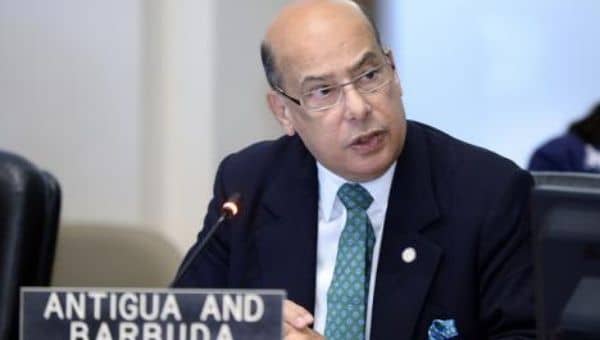
By Sir Ronald Sanders
(The writer is Ambassador of Antigua and Barbuda to the United States and the Organisation of American States. He is also a Senior Fellow at the Institute of Commonwealth Studies at the University of London and at Massey College in the University of Toronto. The views expressed are entirely his own)
As territorial claims go, Guatemala’s claim to all – every square inch – of Belize is, perhaps, the most outrageous.
The only thing that is more outrageous than the scale of the claim is the argument on which it is based.
In this context, it would have been right to expect the Belizean electorate, at a referendum held on May 8, to vote a resounding ‘yes’ to the question: “Do you agree that any legal claim of Guatemala against Belize relating to land and insular territories and to any maritime areas pertaining to these territories should be submitted to the International Court of Justice (ICJ) for final settlement and that it determine finally the boundaries of the respective territories and areas of the Parties?”
As it happened, early counts show that 55.38 per cent of the voters gave their consent. At its referendum in April 2018, the majority of the Guatemalan electorate, that turned out to vote, also assented to submitting the territorial issue to the ICJ.
Interestingly, unlike the high voter turn-out, just shy of 65 per cent in Belize, only 26.65 per cent of the electorate in Guatemala showed up for the referendum, although 95.88 per cent of them voted yes. Therefore, there was remarkably little interest by the Guatemalans in an ICJ decision that might quash the claim to Belize. But, a high degree of concern by Belizeans about the possible loss of their country. In the end, the majority of the Belizean voters put their faith in the legality of their cause, and the renowned fairness of the Justices of the ICJ.
The Guatemala territorial claim will now head to The Hague in the Netherlands for a peaceful and legal settlement after decades of threats to the territorial integrity and security of Belize by successive Guatemala governments and their military. Indeed, no one born since Belize became independent from Britain in 1981, knows a single day in which their lives have not been overshadowed by the Guatemala claim. The country’s development, despite the threats, has been remarkable, but it tells a story of how much more economically and socially advanced Belize could have been had this unremitting peril not hung over its head like the sword of Damocles.

The ICJ will have to determine the merits of the Guatemalan claim which, basically, is the allegation that is has been dispossessed of the territory, constituting Belize, by British settlement. It also asserts that one clause of an ancient and arcane Treaty, which it signed with Britain in 1859, establishes the rights of its claim. For its part, Britain flatly rejected the Guatemalan argument from the outset.
Beyond the fantasy of rights accorded under one clause of the 1859 Treaty, Judge Stephen M. Schwebel, who was President of the International Court of Justice (1997-2000), has pointed out that: “The title of Great Britain and, since independence, of Belize (over all of Belizean territory), is also sustained by considerations of customary international law. Britain initially acquired title to the territory of Belize by occupation beyond the limits of the Anglo‐Spanish Treaties of 1783 and 1786 as far south as the River Sarstoon prior to the acquisition of independence by Guatemala in 1821. There was thus no basis on which Guatemala could validly invoke the doctrine of uti possidetis juris (a principle of international law which provides that newly formed sovereign states should have the same borders that their preceding dependent area had before their independence) in support of its claim to Belizean territory. Nor has Guatemala ever occupied, possessed or administered any part of the territory of Belize. Its claim is a claim without substance in international law”.
But, this is in the future. Belize and Guatemala now have to seek the consent of the ICJ to hear the case. Much legal work lies ahead of both governments. However, once it starts, the process should move rapidly. The Court’s record of delivering judgements in a timely manner is exemplary.
For now, there are other matters that are pressing, particularly a challenge in the Belizean Court by the opposition, People’s United Party (PUP), that a Special Agreement between the governments of Belize and Guatemala is unconstitutional. The Special Agreement sets out the accord between the two governments to settle the claim at the ICJ once referenda in both countries gave consent.
Given the fact that 64.93 per cent of the Belize electorate turned out to vote and that 55.38 per cent of that number voted in favour, the PUP should withdraw its challenge from the local court.
The majority of the Belizean people have spoken and in democracies the will of the majority prevails. Further, there was a vigorous campaign leading to the referendum in which the PUP and others strongly voiced their opposing opinions and positions to the public. Nonetheless, the majority voted to submit the territorial claim to the ICJ. There can be no greater nor more powerful voice than that of the majority in any society.
The PUP should now do the right thing and drop their case. If they proceed with it, nothing more than delays and disruption will be achieved, and few will thank them for it. The business community, foreign and local investors, financial institutions, and clearly the people themselves, want to have finality to the Guatemalan claim so that they can plan their lives and Belize’s future.
There is greater reason for the PUP to accept and respect the voice of the people, because it is the PUP itself that did a great deal of the work to bring Belize and Guatemala to the point where a peaceful and legal settlement can be brought to this long-standing and nationally debilitating issue. National interest must prevail over party politics.
Commenting on the referendum result, the British government summed it up well in saying: “Through, at times, very lively and passionate debate, discussion, and deliberations, Belizeans confirmed that the ICJ route is the best way to resolve differences.”
From around the world, other governments and peoples have welcomed the decision of the Belizean electorate to proceed to the ICJ. If others can respect the will of the Belizean people, then those who fought and lost should also do so.
Responses and previous commentaries: www.sirronaldsanders.com
Advertise with the mоѕt vіѕіtеd nеwѕ ѕіtе іn Antigua!
We offer fully customizable and flexible digital marketing packages.
Contact us at [email protected]















